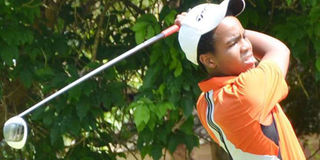Players with lower handicaps must give more strokes

Mathew Wahome follows his tee during the Nyali Open on December 12, 2015 at Nyali Golf Club. PHOTO | FILE |
What you need to know:
- We play the game of golf by the rules set by R&A and the United States Golf Association (USGA).
- Those with handicaps between 12 and 20, need to watch their office or whatever trade they ply. Those that play off handicaps below 11 are either talented or need to watch their homes.
- The word “must” is an instruction. All clubs must now use the new handicap allowances. Low handicappers must get used to giving more strokes.
The next person you hear telling you to give until it hurts may not be your pastor. It may very well be your golf Captain or your inter-club league convenor. This pronouncement will be painful for the low handicappers while those playing from lofty handicaps will be smiling. It will be all the way to the bank for some.
We play the game of golf by the rules set by R&A and the United States Golf Association (USGA). These two organisations, however, do not provide us with a handicapping system. Under the rules, an amateur golfer will be disqualified for neglecting to write their handicap on the scorecard but these same rules don’t tell us how to go about getting one.
Enter the CONGU system, which has been tracking your playing abilities and has given you a handicap based on the cards that you have submitted. It has been said that those that have handicaps that are 21 and above, need to watch their swings.
NEW RULES
Those with handicaps between 12 and 20, need to watch their office or whatever trade they ply. Those that play off handicaps below 11 are either talented or need to watch their homes.
For those that are either talented or hardly seen at home, there is something new to worry about. The CONGU handicapping system has just produced a new set of rules that require you to give more strokes to the high handicappers that you play four-ball (better ball) matches with.
You will no longer be giving three-quarters of the difference between you and the other three players. As the back marker, you have to now concede strokes to the other three players based on 90 per cent of the difference between the full handicaps.
This weekend sees the start of the 2016 Nairobi District League. The format for the league matches, which is four-ball match play, will be subject to the 90 per cent stroke allowance.
CHEATED OF STROKES
As Sigona Golf Club hosts newcomers Ruiru Golf Club or as Royal Nairobi Golf Club visit Kiambu Golf Club, the issue of strokes being conceded or received will be top on the minds of the league convenors. This will play a major part in how players are paired this year and the visiting teams will be keen to ensure that they try and use this to their advantage.
The one thing that will come as a rude awakening for many golfers who like to play the match play format is that when it comes to singles matches, the allowance will be the full difference between the handicaps of the players.
This is not a new rule, but many golfers with high handicaps have been cheated of strokes for not knowing what they are entitled to.
Now, before you go dismissing the issue of the allowances, let me bring to your attention three words that are used often in the Rules of Golf and the CONGU manual. They are “may”, “should” and “must”.
The word “may” denotes option. For example, you may take relief from casual water. You don’t have to and may play the ball as it lies but should you choose, you have the option.
The word “should” is a recommendation. For example, you should mark the position of the ball in the casual water before you take relief. You will not be penalised if you picked your ball from the casual water before marking it. It is, however, good practice to do so.
The word “must” is an instruction. All clubs must now use the new handicap allowances. Low handicappers must get used to giving more strokes.
[email protected] The author is a Kenya Golf Union Executive




